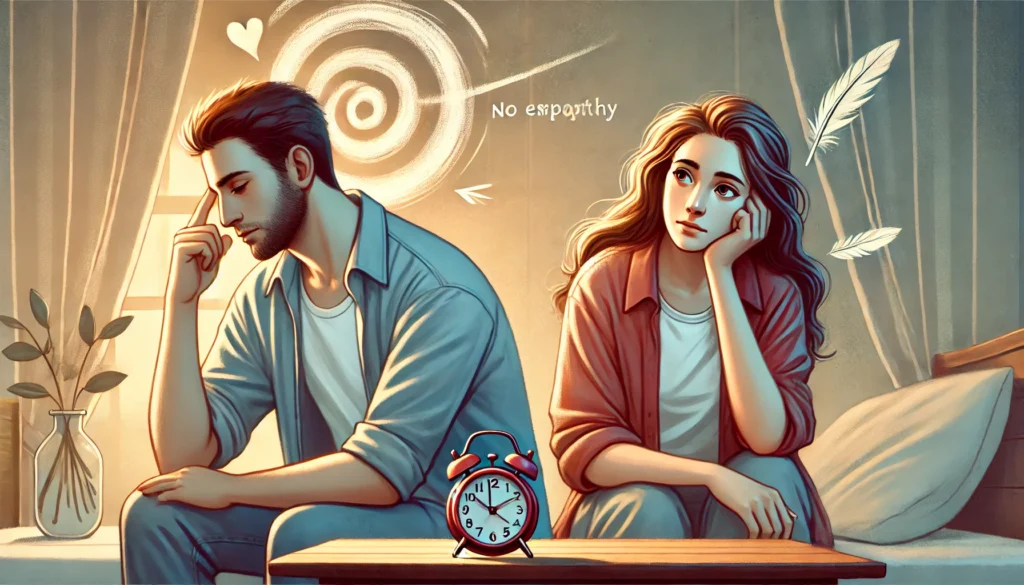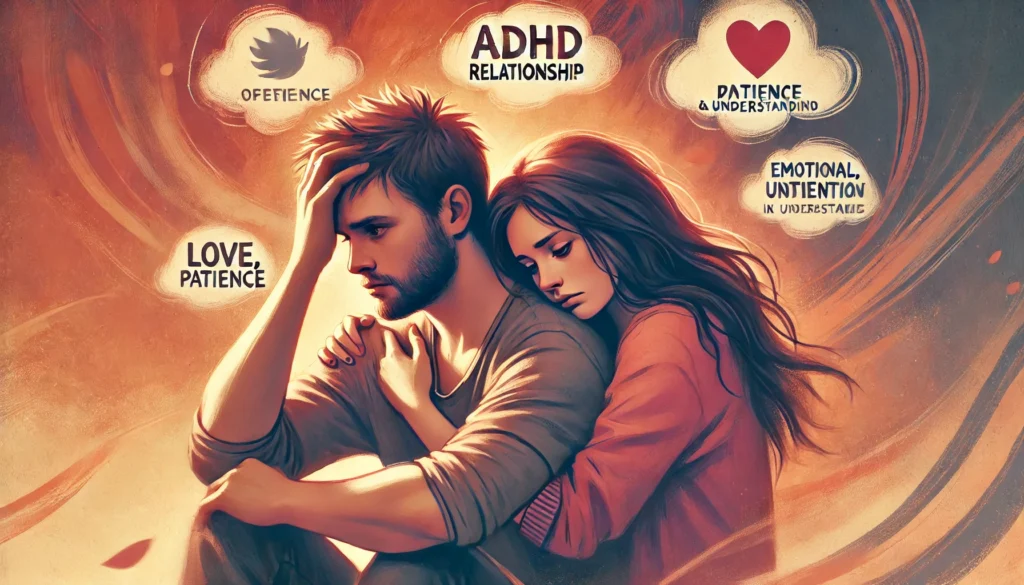The Nature of ADHD and Its Impact on Love
ADHD, characterized by symptoms such as impulsivity, hyperactivity, and inattention, can significantly influence romantic relationships. It’s essential to recognize how these symptoms manifest in love and affection. For instance, a partner with ADHD may exhibit traits of obsessive love, where their focus on the relationship can be intense and consuming. This intensity can be both exhilarating and overwhelming, highlighting the need for understanding and balance.
In addition, ADHD can lead to unpredictable behavior that might be misinterpreted by a partner. The inconsistency in attention and affection can create a sense of instability in the relationship. Understanding the underlying causes of these behaviors is crucial for both partners to navigate the relationship successfully.
Moreover, the impulsivity associated with ADHD can lead to spontaneous decisions that might not always consider the partner’s feelings or the long-term implications. This can lead to conflicts or misunderstandings, emphasizing the importance of communication and mutual understanding.
You may also like: Enhancing Concentration: Strategies for ADHD
Female ADHD and Relationships
The presentation of ADHD symptoms can differ between genders, with women often exhibiting less overt hyperactivity. Instead, their symptoms might manifest as internal restlessness and emotional dysregulation, which can pose unique challenges in romantic relationships. Women with ADHD might struggle with maintaining focus during conversations or emotional exchanges, potentially leading to misunderstandings or feelings of neglect in their partners.
Furthermore, societal expectations can exacerbate the challenges faced by women with ADHD in relationships. Women might feel pressured to conform to certain roles, leading to increased stress and difficulty in managing their symptoms. Recognizing these pressures and openly discussing them can help alleviate some of the burdens.
Additionally, emotional dysregulation can lead to heightened sensitivity to perceived slights or criticisms, which can impact relationship dynamics. Understanding these emotional responses and working together to address them can foster a more supportive and empathetic partnership.
ADHD and Emotional Connection
ADHD can significantly influence how emotional connections are formed and maintained in romantic relationships. The condition can lead to fluctuating levels of emotional availability, which can be confusing for partners who might misinterpret these variations as a lack of interest or commitment.
It’s also important to note that individuals with ADHD might express their emotions differently, relying more on physical gestures or acts of service rather than verbal affirmations. Understanding these differences in emotional expression can help partners feel more connected and appreciated.
Finally, fostering emotional connections in an ADHD relationship requires patience and understanding. Both partners need to work on recognizing and validating each other’s emotional needs, creating an environment where both feel valued and understood.
Challenges in ADHD Relationships
Communication Barriers
Effective communication is the cornerstone of any relationship. In ADHD relationships, maintaining open and clear communication can be challenging. Distraction and impulsivity may lead to interruptions or missed cues, resulting in frustration for both partners. Establishing communication strategies, such as setting aside dedicated time for discussions without distractions, can help mitigate these barriers.
Another challenge is the tendency for individuals with ADHD to forget important details or commitments, leading to misunderstandings or feelings of neglect. Implementing tools like shared calendars or reminder systems can help bridge these gaps and enhance communication.
Moreover, it is essential to approach conversations with patience and empathy. Recognizing that communication barriers stem from ADHD symptoms rather than intentional neglect can foster a more understanding and cooperative atmosphere.
Managing Emotional Intensity
ADHD often brings heightened emotional responses, which can affect romantic dynamics. Partners may experience mood swings, leading to unpredictable interactions. Understanding these emotional fluctuations and developing coping mechanisms, such as mindfulness practices or professional counseling, can aid in managing the emotional intensity associated with ADHD.
It’s also beneficial for partners to establish a safe space where emotions can be expressed freely without judgment. This can help reduce the pressure on the ADHD partner to suppress their emotions, leading to healthier interactions.
Additionally, recognizing the triggers that lead to emotional intensity can be a valuable tool for both partners. By identifying and addressing these triggers, couples can work together to create strategies that minimize emotional upheavals.
Balancing Obsessive Love
The intense focus and energy that a partner with ADHD can bring to a relationship might initially seem like passion but can evolve into obsessive love. This intensity can overshadow personal boundaries and lead to dependency. It’s crucial to establish and respect personal space and individuality within the partnership to maintain a healthy balance.
Creating boundaries in the relationship can help both partners maintain their individuality. Encouraging each other to pursue personal interests and hobbies can prevent the relationship from becoming all-consuming.
Moreover, setting clear expectations about personal space and time can help balance the intensity of the relationship. This can include scheduled alone time or activities that allow each partner to recharge independently.
Overcoming Trust Issues
Trust can be a fragile aspect of any relationship, particularly when ADHD is involved. The impulsive behavior and forgetfulness often associated with ADHD can inadvertently lead to broken promises or unmet expectations, which can erode trust over time.
To rebuild trust, it’s important for both partners to communicate openly about their feelings and concerns. Transparency about ADHD symptoms and their impact on behavior can help mitigate misunderstandings and foster a sense of trust.
Additionally, setting realistic expectations and acknowledging when mistakes are made can go a long way in restoring trust. Apologizing and making amends when necessary can help repair any damage done and reinforce the commitment to the relationship.

Strategies for Building Stronger Bonds
Fostering Understanding and Empathy
Empathy is vital in any relationship, particularly when ADHD is involved. Educating oneself about ADHD and its implications fosters a supportive environment where both partners feel understood. This understanding can be further enhanced by attending workshops or support groups focused on ADHD and relationships.
Partners can also benefit from reading books or articles about ADHD to gain a deeper understanding of the condition. This knowledge can help demystify the behaviors associated with ADHD and reduce frustration.
Furthermore, practicing empathy involves actively listening to each other’s concerns and validating their experiences. By showing genuine interest and compassion, partners can create a more nurturing and supportive relationship.
Developing Routines and Structures
Creating routines and structures can provide stability in an ADHD relationship. Predictability helps manage symptoms and reduces stress. Couples can benefit from establishing daily routines, using organizational tools, and setting reminders to keep both partners aligned and focused on their shared goals.
In addition to daily routines, setting long-term goals and breaking them down into manageable steps can help partners stay focused and motivated. This can be particularly helpful in managing ADHD-related procrastination or forgetfulness.
Moreover, involving both partners in the planning and organization process can foster a sense of teamwork and collaboration. By working together to create routines, couples can strengthen their bond and create a more harmonious living environment.
Encouraging Self-Care and Independence
While supporting a partner with ADHD is essential, it’s equally important to encourage self-care and independence. This balance ensures that both partners maintain their individuality and personal growth. Encouraging hobbies, personal time, and self-reflection can contribute to healthier relationship dynamics.
Partners should also prioritize self-care practices that promote mental and emotional well-being. This can include activities such as exercise, meditation, or pursuing creative outlets that provide relaxation and fulfillment.
Additionally, encouraging independence involves respecting each other’s need for personal space and time. By allowing each other the freedom to pursue individual interests, partners can maintain a sense of autonomy within the relationship.
Building Resilience Together
Building resilience is crucial for navigating the ups and downs of an ADHD relationship. Couples can work on developing coping strategies that help them manage stress and adversity together.
This might involve learning stress-reduction techniques such as deep breathing exercises or practicing gratitude to shift focus from challenges to positive aspects of the relationship.
By facing challenges as a team and supporting each other through difficult times, partners can build a resilient relationship that can withstand the test of time.

Showing Affection in ADHD Relationships
Understanding Different Expressions of Love
ADHD can influence how affection is expressed and perceived. Some partners may exhibit love through acts of service or physical touch, while others might express it verbally. Recognizing and appreciating these different love languages can enhance emotional connection and satisfaction within the relationship.
Partners should have open discussions about their preferred love languages and how they like to give and receive affection. This understanding can help bridge any gaps in emotional expression and ensure both partners feel loved and appreciated.
Additionally, being receptive to different expressions of love can broaden one’s perspective and deepen the emotional bond between partners. Embracing diverse ways of showing affection can enrich the relationship and create a more fulfilling partnership.
Being Patient and Flexible
Patience and flexibility are key when navigating ADHD relationships. Understanding that plans might change and being adaptable to unexpected events can alleviate tension. Flexibility in expectations and routines allows for a more harmonious relationship environment.
Partners should practice patience when dealing with the challenges associated with ADHD. Recognizing that certain behaviors are not intentional but are symptoms of the condition can help reduce frustration and promote understanding.
Furthermore, being flexible involves being open to change and adapting to new circumstances. This can include being willing to adjust plans or finding creative solutions to unexpected challenges. By remaining flexible, partners can create a more supportive and resilient relationship.
Celebrating Small Victories
Acknowledging and celebrating small victories can reinforce positive behaviors and strengthen bonds. Whether it’s completing a task, maintaining focus during a conversation, or simply spending quality time together, celebrating these moments fosters a positive and supportive atmosphere.
Partners should make a conscious effort to recognize and celebrate each other’s achievements, no matter how small. This can include verbal praise, small gestures of appreciation, or planning special activities to mark these milestones.
Celebrating small victories also reinforces a sense of teamwork and collaboration. By acknowledging each other’s efforts, partners can build a stronger connection and create a more positive relationship dynamic.
Nurturing a Positive Environment
Creating a positive and supportive environment is essential for fostering a healthy ADHD relationship. This involves promoting positivity and focusing on strengths rather than weaknesses.
Partners can work on cultivating a positive mindset by practicing gratitude and highlighting the positive aspects of their relationship. This can help shift focus away from challenges and create a more uplifting atmosphere.
Additionally, creating a supportive environment involves offering encouragement and understanding during difficult times. By being each other’s biggest cheerleaders, partners can foster a relationship that thrives on mutual support and love.

Future Implications and Trends
As our understanding of ADHD evolves, so too do the strategies for managing its impact on romantic relationships. Emerging research suggests that personalized interventions, including cognitive-behavioral therapy and mindfulness practices, show promise in improving relationship dynamics. Additionally, technological advancements offer new tools for managing symptoms and enhancing communication.
The future of ADHD relationships is bright, with ongoing research and increasing awareness paving the way for more effective strategies and support systems. By embracing these insights and continuing to learn, partners can build stronger, more resilient bonds.
As technology continues to advance, new tools and applications are being developed to help individuals with ADHD manage their symptoms more effectively. These innovations can enhance communication and organization, making it easier for couples to navigate the challenges of ADHD.
Furthermore, the growing awareness of ADHD and its impact on relationships is leading to more resources and support systems for couples. From online forums to in-person support groups, partners can connect with others who share similar experiences and gain valuable insights and advice.
Conclusion
Navigating love in an ADHD relationship requires patience, understanding, and empathy. By recognizing the unique challenges and employing strategies to foster connection, partners can cultivate a relationship that is not only resilient but also deeply fulfilling. Embrace the complexities, celebrate the victories, and continue to build a partnership that thrives on mutual respect and love.
Ultimately, building a strong and healthy ADHD relationship involves working together as a team and supporting each other through challenges and triumphs. By fostering open communication, empathy, and understanding, partners can create a relationship that is both rewarding and enduring.
In conclusion, love in an ADHD relationship requires effort and dedication from both partners. By embracing the complexities and celebrating the victories, couples can build a partnership that thrives on mutual respect and love. Together, they can navigate the challenges of ADHD and create a fulfilling and lasting relationship.
Further Reading:
How does ADHD affect relationships and marriage?
The ADHD Strain: How Relationships Collapse Under the Weight of ADD
5 ways ADHD can affect your romantic relationships
Important Note: The information contained in this article is for general informational purposes only, and should not be construed as health or medical advice, nor is it intended to diagnose, prevent, treat, or cure any disease or health condition. Before embarking on any diet, fitness regimen, or program of nutritional supplementation, it is advisable to consult your healthcare professional in order to determine its safety and probable efficacy in terms of your individual state of health.
Regarding Nutritional Supplements Or Other Non-Prescription Health Products: If any nutritional supplements or other non-prescription health products are mentioned in the foregoing article, any claims or statements made about them have not been evaluated by the U.S. Food and Drug Administration, and such nutritional supplements or other health products are not intended to diagnose, treat, cure, or prevent any disease.


